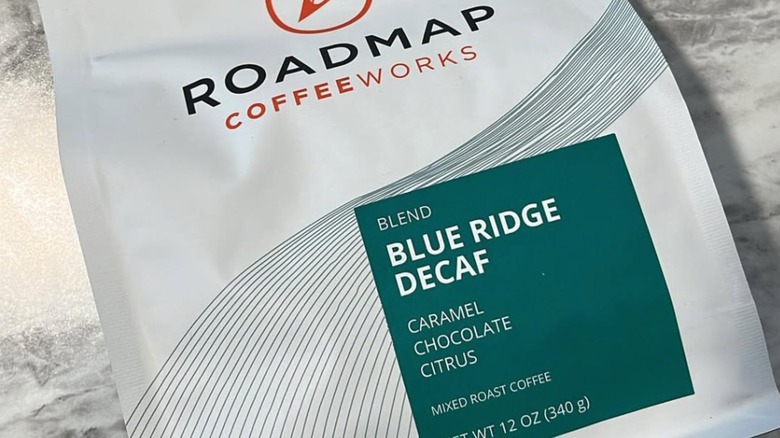The One Decaf Whole-Bean Coffee You Should Put Back On The Shelf
If you're in search of a satisfying decaf coffee, Peet's Major Dickason's Blend Decaf is one that you might want to reconsider. Ranked last in our lineup of 13 decaf whole bean coffees, this one fails to deliver on the essential characteristics that coffee enthusiasts crave. Its flavor profile is overwhelmingly one-dimensional, with none of the layered complexity you'd expect from a premium decaf. Instead of balanced richness, you're met with an underwhelming, almost bitter aftertaste that lingers longer than desired.
The aroma is equally uninspiring, lacking the inviting warmth that sets great decaf coffees apart. Our reviewer noted that the coffee's boldness veers into harshness, overpowering any subtle notes that might have redeemed the cup. While Peet's reputation for robust coffee blends is well-established, its decaf version misses the mark, leaving drinkers feeling like they're sipping on a diluted imitation of the original. With the decaf coffee market expected to grow to nearly $40 billion by 2033 according to Future Market Insights, brands need to take heed and step their game up if they want a piece of the pie.
That said, Peet's does offer a range of decaf roasts, including Mocca-Java and Sumatra single origin, each with greater depth and complexity. These options better embody high-quality decaf coffee that stands out in both attributes and consistency. But for coffee lovers seeking a rich, full-bodied experience without the caffeine, Major Dickason's Blend Decaf simply doesn't rise to the occasion. With so many exceptional decaf options available, this is one is best left on the store shelf.
The secrets of a great decaf
Decaf coffee has a reputation for being the sad cousin of the coffee family, but it doesn't have to be that way. The secret to a great decaf lies in how it's made. Take the sugarcane (ethyl acetate) method, for example: It's used by Regent Coffee Colombia Risaralda Decaf, our number two pick, and it works like a charm. This process uses natural byproducts from sugarcane to keep the beans' sweetness and complexity intact.
Then, there's the Swiss Water Process (Peet's uses this method for all of its decaf coffees) — a chemical-free method that sounds fancy but is actually pretty simple. It uses just water and some clever science to remove caffeine. The beans are soaked in hot water, which draws out the caffeine. That water is then filtered through carbon to get rid of the caffeine molecules while keeping the good flavors locked in. It's like giving the beans a bath, but only letting the good stuff come out! So what happens to the caffeine once it's evicted? Don't worry — it's not sitting in a landfill somewhere. It's recycled into energy drinks, sodas, and even painkillers. Yup, that jolt you get from a can of cola or a pre-workout mix? It's probably decaf coffee's cast-off caffeine.
But when it comes to flavor, Roadmap Blue Ridge Decaf, our number one pick, is a game changer. It brings together rich milk chocolate and bright citrus notes so perfectly that you might forget it's decaf. Whether you drink it black or with a little cream, it's proof that decaf can be just as flavorful as regular coffee.

